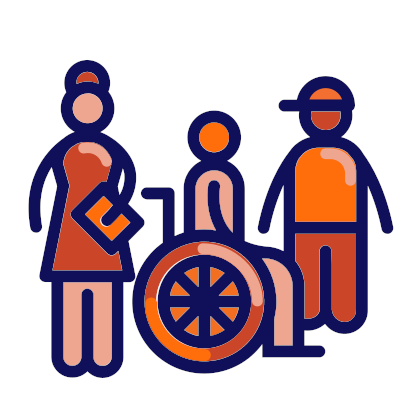Tackling discrimination

Schools can tackle discrimination by promoting democracy, respect for human rights and citizenship.
To ensure that all students’ needs are met equally, schools need to prioritise language and cultural competences, multiperspectivity in history and gender equality. In this way, students can acquire competences for democratic culture, to fulfil their potential in school as well as in society.
Facts & figures
Students with disabilities in Europe have higher early-school leaving-rates than their same-age peers.[1]
Black Caribbean students are three times more likely to be excluded from English schools than white pupils. [2]
A survey of nine EU countries showed that 33% of Roma students were in schools where most pupils were Roma, with 13% in Roma-only schools.[3]
What is discrimination?
Discrimination is treating a person badly or unfairly on account of a personal characteristic, such as national, ethnic or social origin, gender, language, religion, disability or sexual orientation.
There are two basic forms of discrimination:
- Direct discrimination – treating someone less favourably than you treat or would treat another person in the same situation, e.g., a school refusing to admit a student because they are Roma,
- Indirect discrimination – applying a provision, criterion or practice in the same way for all of a group which has the effect of unfairly disadvantaging people in the group who share a particular characteristic, e.g., a school uniform policy banning headgears for girls and boys may unfairly disadvantage Muslim girls and Jewish boys.
Discrimination can occur in almost any aspect of school life, from the attitudes and expectations of teachers to school rules and codes of conduct, selection and grouping practices, curricula, teaching methods and materials, changing facilities, career guidance, canteen food and the physical school environment.
Whatever form it takes – whether it be parallel school systems for different ethnic groups, concentrations of minority or disadvantaged children in the same school, or differential access to educational provision, it means a lower quality of educational experience for the students being discriminated against.
Why is tackling discrimination important at school?
Discrimination is a human rights violation. Article 14 of the European Convention on Human Rights contains a prohibition on discrimination with respect to any of the rights and freedoms guaranteed under the Convention. Article 2 of Protocol No.1 requires the state to ensure that all individuals have access to its formal educational provision.
“No person shall be denied the right to education.”[4]
“The enjoyment of the rights and freedoms set forth in this Convention shall be secured without discrimination on any ground such as sex, race, colour, language, religion, political or other opinion, national or social origin, association with a national minority, property, birth or other status.”[5]
Tackling discrimination is not simply a duty laid on schools by the European Convention of Human Rights, it is also important for student well-being and educational success. Children and young people who are treated unfairly or discriminated against are more likely to have:
- negative attitudes to school
- lower levels of motivation and academic achievement
- a higher risk of dropping out of formal education
- experience of bullying
- mental health problems.
Feeling different or ‘less’ than others can be an isolating experience. Over time it undermines an individual’s capacity for participation in society, e.g., their sense of self-efficacy, openness to other cultures and beliefs, tolerance of ambiguity and flexibility and adaptability - all of which lie at the heart of the Council of Europe Reference Framework of Competences for Democratic Culture.
Lack of opportunity due to discrimination in school also damages society. It intensifies social divisions, fuels xenophobia and intolerance and undermines social cohesion.
“States should adopt a combination of strong anti-discrimination measures and policies that promote more inclusive education systems where all children learn together. This is not a utopian project, but an achievable goal that can ensure more equal treatment of all children and, in the long term, improve social cohesion”[6]
What are the challenges?
One of the challenges facing the tackling of discrimination in schools is a lack of data. European-wide statistics specifically focused on discrimination in schools are scarce. Children with disabilities, for example, do not always appear in national statistics and may be ‘invisible’ to decision-makers, service providers and the public. Such children are particularly vulnerable to discrimination, however, and are often segregated in terms of educational provision.
These are not the only ‘invisible’ minorities in schools. For example, LGBTI students often feel they have to hide their sexual orientation at school to avoid victimisation.
Another key challenge is the existence of negative stereotypes about minority groups among teachers, parents, students and other school stakeholders. Such stereotypes are often deeply embedded in everyday school life and practice, so much so that they are taken as ‘normal’, e.g., stories and images in textbooks that reflect a stereotyped portrayal of the roles of women and men, girls and boys. Stereotypes help to fuel prejudiced and aggressive behaviour between students, lower expectations from teachers and negative attitudes from parents, e.g., refusing to allow their children to be taught alongside refugee or migrant children.
Stereotyping is difficult to root out in schools because its origins lie in wider society. This is exacerbated by the current preponderance of hate speech, fake news and conspiracy theories in digital media, especially social media.
The situation is compounded when minority groups are under-represented on school staff. Students lack role - models and teachers do not have the access to information about or insights into other cultures and ways of life that come with belonging to a more diverse profession. They lack the intercultural competences with which to create inclusive and quality learning environments, e.g., openness to cultural otherness, tolerance of ambiguity, plurilingual skills and knowledge and critical understanding of alternative cultures, religions and histories.
Tackling discrimination is more challenging when there is a lack of dialogue between schools and parents. Often this is on account of language difficulties, but it is also a problem where students’ parents work abroad leaving their children in the charge of elderly relatives or others.
How can schools get active?
Ensuring all learners of any age are provided with meaningful, high-quality educational opportunities alongside their peers requires a whole-school approach.
It begins by schools understanding who might be at risk of discrimination, what they can do to minimise discrimination and how they can support students at risk of discrimination. A good place to start is with an assessment of the current situation, identifying the strengths that exist in the school, but also needs and priorities. Consulting with school stakeholders is essential, especially students and, where possible, parents – e.g., using surveys, questionnaires, focus groups, etc. Given the sensitivities involved there is argument for collecting information on individuals’ experiences of discrimination anonymously.
Based on an assessment of the current situation it is possible to identify immediate priorities for policy development. Priorities will vary with the school, but might include, for example:
- language development
- gender equality
- accessibility of the physical environment
- intercultural competences.
The setting of initial priorities should go hand in hand with professional development for senior leadership teams as well as teaching staff. An element of personal as well as professional reflection is essential to the tackling of discrimination in school. In particular, it is important for school staff to be able to consider their own beliefs and values with regard to discrimination, including their own unconscious biases and prejudices.
Schools can then turn to the longer-term aspiration of creating a culture of non-discrimination. Central to this process is the challenging of negative stereotyping, both in classrooms and around the school. This can be done in a variety of ways, including:
- challenging stereotypes when they are heard
- discussing stereotypes with students
- identifying stereotypes in the curriculum
- highlighting stereotypical images and roles in textbooks
- allocating posts of responsibility equitably
- choosing different ways of dividing up students
- providing a range of role-models
- setting up mechanisms for monitoring incidents of discrimination.
Challenging stereotypes goes alongside the promotion of inclusion and an appreciation of the benefits of diversity in school life. This can take different forms, including:
- using inclusive language
- including human rights, democratic citizenship and intercultural education in the curriculum
- encouraging the discussion of controversial issues
- promoting student voice
- involving students in peer education and peer mediation activities
- welcoming parents and involving them in school decision-making
- forming partnerships with different organisations and groups in the community.
[1] Education section of the The European Disability Forum
[2] Article: UK: Racial discrimination is a reality in schools and classrooms. Education International
[3] EU Fundamental Rights Agency, “Second European Union Minorities and Discrimination Survey (EU-MIDIS II) Roma – Selected findings” (2017).
[4] ECHR, Article 2, Protocol No.1
[6] Position paper: Fighting school segregation in Europe through inclusive education by the Council of Europe Commissioner for Human Rights
 Resources on Tackling discrimination
Resources on Tackling discrimination
Address: Nezalezhnosti street 19, Kovel, Volynska region, 45000
Country: Ukraine
Project: Student Council President Elections
 Working language during the project:
Working language during the project:
- Ukrainian
 Themes of the Council of Europe campaign “FREE to SPEAK, SAFE to LEARN - Democratic Schools for All” covered:
Themes of the Council of Europe campaign “FREE to SPEAK, SAFE to LEARN - Democratic Schools for All” covered:
- Making children’s and students’ voices heard
- Improving well-being at school
- Developing democratic school environment
 Competences from the Reference Framework of Competences for Democratic Culture (CDC) addressed and where / how they were integrated:
Competences from the Reference Framework of Competences for Democratic Culture (CDC) addressed and where / how they were integrated:
- Value democracy, justice, fairness, equality and the rule of law
- Respect
- Civic-mindedness
- Knowledge and critical understanding of the world: politics, law, human rights, culture, cultures, religions, history, media, economies, environment, sustainability
- Conflict resolution skills
Preparing for the Student Council President Elections students learn about and gain understanding on the topics of laws and rules, the democratic process, the voting system, the media, human rights. Students are given the opportunity to experience the values and principles of the democratic process in action: they participate in shared governance where they may put civic education and democracy into action, develop an awareness of good leadership qualities. These include critical thinking, analysing information, expressing opinions, taking part in discussions and presidential debates, negotiating, conflict resolution and participating in the electoral campaigns. Students increase their knowledge of political efficacy, campaign strategies and gain an understanding of the democratic process. In this way they become confident, tolerant, open and courageous to defend their point of view. Students reflect on and assert the power and decision-making processes in their school and government.
- Linguistic, communicative, and plurilingual skills,
- Knowledge and critical understanding of language and communication
- Skills of listening and observing
Developing campaign strategies, preparing campaign materials, students create posters, flyers, posters, notices, banners, emails, e-board announcements, forums and web pages to conduct their electoral campaigns. Participating in these activities they develop their linguistic and communicative skills, learn to use sound judgment to make good decisions based on information gathered and analysed. Students learn to listen actively to others, work with and stand up for others, organise and deliver information appropriately, consider all pertinent facts and alternatives before deciding on the most appropriate action, regulate and control their emotions. They learn to express their ideas effectively in such activities as presentations, meetings, negotiations, debates. Students learn to use appropriate language schemes when they take part in presidential debates.
- Cooperation, communication, responsibility, leadership, citizenship
Organizing a central election commission, discussing details of how to run the elections, election rules, posting policy and campaign plans, students take personal responsibility for task performance, developing a spirit of solidarity with others. They learn to complete a task in a timely and consistent manner. They learn to cooperate in building a team, working together, sharing tasks, being responsible for certain issues and supporting others. Working well in a team, students show their respect and empathy to others and have the maturity to realise that no activity is a stand-alone activity. Being engaged in discussions students develop their communication skills, learn to solve problems. They learn to take responsible decisions in choosing a candidate to vote for.
 Target group age range:
Target group age range:
- 11 -15 and
- 15 - 19
 Level of education:
Level of education:
- Lower secondary education
- Upper secondary education
Short description of the project:
The project focuses on active citizenship, human rights, awareness of good leadership qualities, of human relations, of power structures and of how to operate effectively within them. Student government would not exist without students who are interested in providing input on institutional issues and serving as representatives of the student body.
The election process is still one of the primary means for students to begin their political participation and gain an understanding of the democratic process. Involvement in shared governance at the school level begins with participation in student government elections. Every student at Kovel City Gymnasium is eligible to vote for the Student Council President. It is important that students understand the voting system to be used and it is advisable to raise any specific questions with management before the elections are held.
The project includes three stages. At the first stage (October, two weeks), students organise a Central election commission, the members of which discuss details of how to run the elections, election rules, posting policy, campaign plan. All candidates register for the 2019 Student Council Election President and conform to the campaign rules as they are expected to, be familiar with the school policies and regulations. To be placed on the official ballot, all candidates must submit their completed petitions to the office of the Central election commission for Student involvement no later than 4pm on Thursday,22 October. During the pre-election marathon, campaigns play an enormous role.
At the second practical stage (November, 3-4 weeks), the members of the central office compile and publish a list of voters (in order to vote in an election everyone must be registered to vote), registered candidates ask other students to help with a candidate's campaign, meet with a group of students or use school website to develop campaign strategies, prepare campaign materials, print posters, create social media pages and create a Facebook page for campaigning, conducting presidential debates. Candidates are allowed to use flyers, posters, notices, banners, emails, e-board announcements, forums and web pages to conduct their electoral campaigns.
Their campaigns are organised for the purpose of promoting their respective candidates and the values for which they stand. All school members can vote for the candidates and each member has one vote per position. Voting takes place on 7 December 2019 (a Day of local government).
At the third stage the results of the elections are verified and announced by the members of the Central election commission. The Inaugural Ceremony of the Students’ Council president is held on 19 December 2019 (a Day of Gymnasium) in the assembly hall. The student Council President takes the oath during the ceremony and presents her/his speech during the Election Day assembly. S/he talks about the importance of the council body and assures that many more programmes will be conducted under her/his leadership to the utmost satisfaction of the school. The School’s Principal in her presidential remarks congratulates the outgoing student council president, expresses her wishes for the upcoming Student council president and his team to shoulder the responsibilities with human values, to make the best use of the council body, organise variety of programmes and develop leadership qualities.
The newly elected candidate begins working with the current Student Council leaders and attending their meetings to become familiar with the general Student Council procedures and the current projects.
 Aims/objectives
Aims/objectives
- Create citizens who value civic duty and understand the importance of engaging in political activity;
- Provide students with opportunities to participate in shared governance where they may put civic education and democracy into action;
- Promote fairness, equality of opportunity, and justice for all students;
- Develop student potential and encourage them to make a well-informed, honest, interested and active citizenship;
- Develop not only leadership abilities within the youth of today, but also leadership for the community, state and nation of tomorrow. In this process, it is also the objective to develop an awareness of good leadership qualities, hopefully, for a more informed, concerned and active citizenry of tomorrow;
- Increase student involvement and school pride;
- Provide a living workshop of democratic processes, through such activities as elections and participation in a constitutional representative assembly;
- Contribute to the educational experiences of students by providing them with a positive involvement in the school, with widened areas of responsibilities and with more direct participation in organising and implementing activities.
 Expected results/outcomes
Expected results/outcomes
This increases students’ sense of political efficacy, the belief that their political participation is worthwhile. Through engaging in student government elections as candidates, students are more likely to participate actively in civic and political life as adults.
 Changes
Changes
- Students who devote time and energy into their school experience through active engagement in their academic pursuits and participation in extra-curricular activities tend to take initiative, persist at school and enjoy higher levels of achievement.
- Students who run for political office in school elections feel empowered to make decisions in the school setting and begin to understand their power to affect change within their own political environments in the future.
- Students have become aware of their own potentials in making differences to their society.
- Students develop a sincere regard for law and order appropriate to this democratic society.
 Challenges you faced
Challenges you faced
There is little known about the experiences of candidates in student government elections or the students’ perceptions of the election process.
Young adults have limited knowledge of the impact of civic engagement and less confidence in collective actions, such as voting.
 Time-frame of the project:
Time-frame of the project:
October 2019 – December 2019
 Council of Europe materials on citizenship and human rights education used while preparing or implementing your practice:
Council of Europe materials on citizenship and human rights education used while preparing or implementing your practice:
- Reference Framework of Competences for Democratic Culture
- Living Democracy-manuals for teachers
- Democratic governance of schools
- Addressing violence in schools through EDC/HRE
- All Different – All Equal
- Compass
- Compasito
- We CAN!
- Human Rights and Democracy Start with Us – Charter for All
- Freedom(s) - Learning activities for secondary schools on the case law of the European Court of Human Rights
- How all Teachers Can Support EDC/HRE: A Framework for the Development of Competences
- Multimedia Material (ex. video “Beat Bullying”, series of cartoons “Democracy and Human Rights at School”, video “Corporal punishment at school: how two parents decided to change things”)
 Related schools projects
Related schools projects
Bosnia and Herzegovina
Bulgaria
Cyprus
Finland
France
Georgia
Germany
Greece
Ireland
Italy
Lithuania
Malta
Montenegro
Norway
Portugal
Republic of Moldova
Romania
Serbia
Slovenia
Spain
Turkey
United Kingdom







